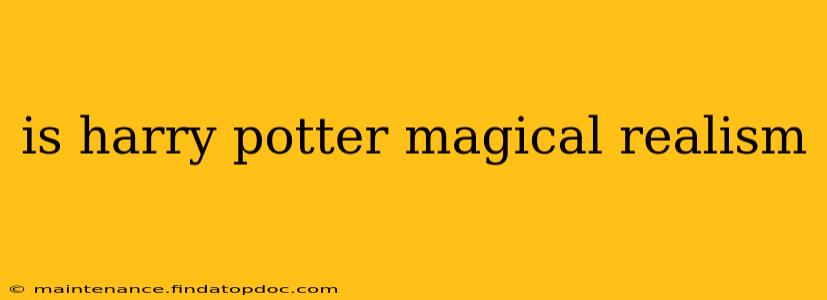Is Harry Potter Magical Realism? A Deep Dive into Genre Classification
The question of whether the Harry Potter series falls squarely into the magical realism genre is a complex one, sparking debate among literary scholars and fans alike. While the series undeniably features magical elements integrated into an otherwise ordinary world, a closer examination reveals nuances that challenge a simple yes or no answer. Let's explore the key characteristics of magical realism and see how the Harry Potter books measure up.
What Defines Magical Realism?
Magical realism, at its core, seamlessly blends fantastical elements into a realistic setting, often without explicit explanation or fanfare. The magic is presented as an accepted part of everyday life, subtly altering the reader's perception of reality. Key features include:
- Mundane Setting: The story takes place in a recognizable, often contemporary world.
- Subtle Integration of Magic: Supernatural events are woven into the narrative naturally, without disrupting the overall realism.
- Lack of Explanation: The magic often remains unexplained, accepted as a fundamental aspect of the world.
- Exploration of Themes: Magical realism frequently tackles profound themes like identity, colonialism, history, and societal structures.
How Harry Potter Fits (and Doesn't Fit) the Bill
The Harry Potter series certainly shares some characteristics with magical realism:
- Mundane Setting (Mostly): The initial setting of the wizarding world within a seemingly ordinary England is a strong point of comparison. Hogwarts, Diagon Alley, and the Ministry of Magic are hidden within plain sight.
- Integration of Magic: Magic is undeniably central to the plot, woven into everyday life within the wizarding community.
However, some key differences separate Harry Potter from typical magical realism:
- Explicit Explanation: Unlike many magical realism novels, the Harry Potter series provides explanations for magical occurrences through spells, potions, and established rules of the wizarding world. This structured magical system contrasts with the often ambiguous and inexplicable magic found in true magical realism.
- Separate Worlds: While hidden, the wizarding world is ultimately distinct from the Muggle (non-magical) world. This separation, though subtle at first, creates two parallel universes rather than a seamless blend of the magical and mundane.
- Focus on Plot and Adventure: The primary focus of the Harry Potter series is a thrilling adventure narrative, whereas magical realism often prioritizes thematic exploration and atmospheric character development.
Is Harry Potter Fantasy, Then?
Many would argue that Harry Potter is more accurately categorized as fantasy literature. Fantasy often features entirely invented worlds and magical systems with clearly defined rules and limitations. This fits Harry Potter perfectly.
What About the "People Also Ask" Questions?
Let's address some common queries surrounding Harry Potter's genre:
H2: Is Harry Potter fantasy or magical realism?
As discussed above, while it incorporates elements of magical realism in its initial presentation of a hidden magical world within our own, the clearly defined rules and separate worlds ultimately categorize Harry Potter more strongly as fantasy.
H2: What are the key differences between fantasy and magical realism?
The core difference lies in the integration and explanation of magic. Fantasy often constructs entirely separate magical worlds with explicit rules, while magical realism subtly integrates magic into an existing realistic setting, often without explanation.
H2: Is the Harry Potter series considered children's literature?
While initially targeted towards younger readers, the Harry Potter series has a broad appeal spanning multiple age groups, dealing with complex themes of love, loss, prejudice, and morality. Its mature themes and growing complexity certainly push the boundaries of typical children's literature.
H2: How does the Harry Potter series use magic to explore themes?
The magic in Harry Potter serves not only to drive the plot but also to explore themes of good vs. evil, prejudice (against Muggles and other magical creatures), the importance of love and friendship, and the consequences of power.
In conclusion, while the Harry Potter series borrows elements from magical realism, its emphasis on a separate, structured magical world and a plot-driven narrative firmly places it within the realm of fantasy literature. Its enduring popularity and impact, however, transcend simple genre classification.
